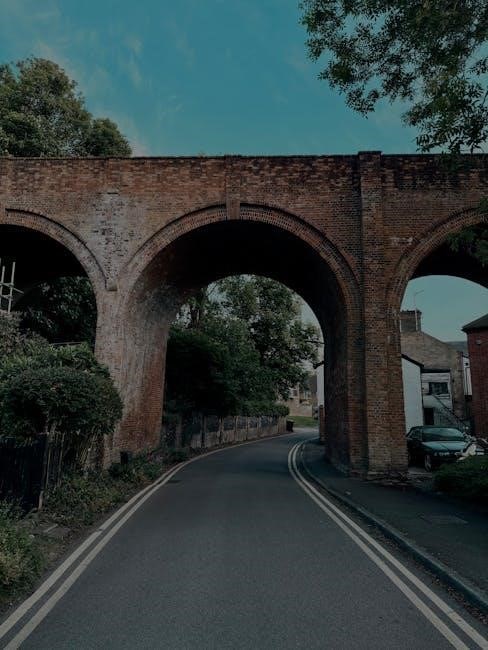
our town pdf
Set in the fictional town of Grover’s Corners, Our Town by Thornton Wilder explores the essence of small-town life, blending the mundane with profound reflections on existence and human connection․
Setting and Historical Context
The play is set in the fictional town of Grover’s Corners, New Hampshire, in the early 20th century, specifically between 1901 and 1913․ The story unfolds in a small, tight-knit community where everyone knows each other’s lives intimately․ The setting is divided into three acts, each representing a different time period: daily life in 1901, a wedding in 1904, and a funeral in 1913․ The town’s layout is simple, with Main Street, a railway station, and Polish Town across the tracks․ The gradual modernization of life is evident, as horses become rarer and cars like Fords appear․ The historical context reflects the quiet, unassuming nature of rural American life during this era, emphasizing the ordinary and universal aspects of human experience․
Cultural and Social Significance
Our Town captures the essence of small-town American life, reflecting the universal human experiences of love, marriage, and mortality․ Set in Grover’s Corners, the play mirrors the quiet, unassuming nature of rural America in the early 20th century․ It highlights the importance of community, where everyone knows each other’s lives intimately, emphasizing the ordinary and the mundane as profound aspects of existence․ The play’s exploration of marriage, family, and daily routines resonates deeply with audiences, offering a timeless commentary on human connection․ Its minimalist style and focus on the everyday have made it a cornerstone of American theater, celebrated for its ability to evoke empathy and reflection on the shared experiences of life․ The play’s enduring popularity underscores its cultural significance as a reflection of American values and traditions․

Themes in “Our Town”
Central themes include the beauty of ordinary life, human connections, and mortality, set against Grover’s Corners’ routines, highlighting the timeless universality of local stories and life’s fleeting nature․
Daily Life and Ordinary Existence
The play captures the essence of daily life in Grover’s Corners, portraying the routines and simple joys of its inhabitants․ From Mrs․ Webb preparing breakfast to Doc Gibbs tending to his duties, the town’s quiet rhythms are revealed․ The first act, titled “Daily Life,” focuses on the mundane yet meaningful moments shared by the townspeople, such as neighbors exchanging pleasantries or the local grocer opening his store․ These scenes highlight the universality of ordinary existence, emphasizing how the smallest details often hold the deepest significance․ Wilder’s portrayal of everyday life in a small town underscores the beauty of simplicity and the interconnectedness of human experiences, making the familiar feel extraordinary and timeless․
Marriage, Love, and Union

Marriage and love are central themes in Our Town, particularly through the union of Emily Webb and George Gibbs․ The play portrays their journey from childhood friendship to matrimony, highlighting the simplicity and profundity of their bond․ The townspeople’s reflections on marriage emphasize its societal role, with most residents marrying and settling down․ The play underscores the emotional depth of love, as seen in Emily’s poignant realization about life’s fleeting nature․ Wilder uses their relationship to explore the human experience, blending joy with melancholy․ The wedding scene serves as a pivotal moment, illustrating the transition from individual life to shared existence․ This theme resonates universally, offering insights into the beauty and challenges of love and commitment in a small-town setting․ The portrayal of marriage in Our Town remains timeless, evoking both hope and nostalgia․

Key Characters
Emily Webb and George Gibbs are central figures, embodying the play’s exploration of life, love, and mortality․ Their journeys highlight human connection and personal growth in Grover’s Corners․
Emily Webb and Her Journey

Emily Webb, a bright and thoughtful young woman, is a central character in Our Town․ Her journey through the play evolves from childhood innocence to profound self-awareness․ Initially, she is portrayed as an idealistic and curious individual, deeply connected to her family and community․ As the story progresses, Emily’s perspective shifts dramatically during her wedding day and her subsequent death, where she gains a deeper understanding of life’s fleeting nature․ Through her character, Wilder emphasizes the importance of appreciating the ordinary moments and the interconnectedness of human experiences․ Emily’s ultimate realization underscores the play’s themes of mortality and the beauty of everyday life, leaving a lasting impact on both the audience and the townspeople of Grover’s Corners․
George Gibbs and His Role
George Gibbs, a kind-hearted but flawed young man, plays a significant role in Our Town as Emily Webb’s husband and a central figure in Grover’s Corners․ Initially portrayed as a typical small-town boy focused on baseball and his future, George evolves into a responsible family man․ His courtship with Emily, leading to their marriage, highlights his loyalty and deep affection for her․ George’s character underscores the challenges of transitioning from adolescence to adulthood, as he navigates life’s responsibilities and grapples with his own imperfections․ His eventual death serves as a poignant reminder of life’s fragility, mirroring the play’s themes of mortality and the importance of appreciating everyday moments․ Through George, Wilder illustrates the universal human experience of growth, love, and the struggle to find meaning in life․

Broadway and Performance History

Our Town debuted on Broadway at Henry Miller’s Theatre on February 4, 1938, and later moved to the Morosco Theatre․ Thornton Wilder won the Pulitzer Prize in 1938․ A 2024 revival at the Ethel Barrymore Theatre ran for 1 hour and 45 minutes without an intermission․
New York Debut and Reception
Thornton Wilder’s Our Town premiered on Broadway at Henry Miller’s Theatre on February 4, 1938, and later transferred to the Morosco Theatre․ The play received widespread acclaim for its minimalist staging and profound exploration of everyday life․ Critics praised Wilder’s innovative storytelling and the universal themes presented․ The production’s success led to Wilder winning the Pulitzer Prize for Drama in 1938․ The play’s simplicity resonated deeply, as it stripped away elaborate sets to focus on the human experience․ A 2024 revival at the Ethel Barrymore Theatre continued this legacy, showcasing the timeless relevance of Wilder’s work․ This revival ran without an intermission, maintaining the original’s intimate and reflective tone․ The play’s ability to connect with audiences across generations highlights its enduring impact on American theater․
Symbolism in the Play
The play uses minimalistic settings and repetition to symbolize the universality of life․ The Stage Manager guides audiences through time and space, emphasizing life’s fleeting nature and deeper meanings․
Use of Time and Space

Thornton Wilder’s manipulation of time and space in Our Town creates a unique narrative structure․ The play unfolds over three acts, each representing a different time period, blending past, present, and future seamlessly․ The Stage Manager acts as a guide, narrating and directing the audience through the fluid transitions․ The minimalist setting, devoid of elaborate props, emphasizes the universality of the story, allowing the audience to focus on the emotional and philosophical depth․ Time is compressed and expanded, highlighting moments of daily life, marriage, and mortality․ Space is similarly fluid, with Grover’s Corners representing both a specific town and a metaphor for human existence․ This innovative use of time and space underscores the play’s themes of continuity, connection, and the eternal nature of human experience․ The audience is invited to reflect on life’s fleeting moments and enduring significance․
Our Town remains a timeless masterpiece, earning Thornton Wilder the Pulitzer Prize in 1938․ Its enduring appeal lies in its universal themes, influencing modern theater and inspiring countless revivals․

Impact on Modern Theater

Our Town has profoundly influenced modern theater, revolutionizing storytelling with its minimalist staging and direct audience interaction․ Its focus on universal themes and everyday life inspired playwrights to explore simplicity and depth․ The play’s Pulitzer Prize in 1938 solidified its reputation, making it a benchmark for dramatic innovation․ Contemporary productions continue to adapt its themes, proving its timeless relevance․ The play’s ability to connect with audiences on a human level has made it a staple in theatrical repertoire, ensuring its enduring legacy in the world of drama and performance art․ Its influence is evident in many modern plays that prioritize emotional authenticity and introspection over elaborate settings․